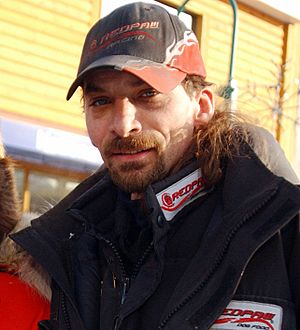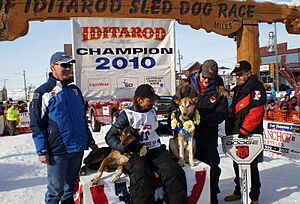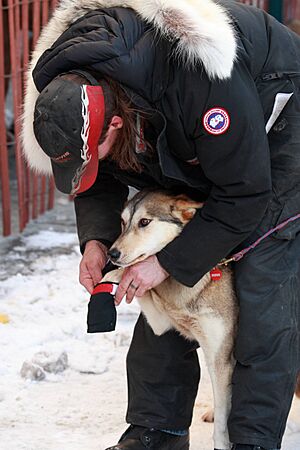Lance Mackey facts for kids

Mackey at the 2009 Iditarod Race
|
|
| Personal information | |
|---|---|
| Nationality | United States |
| Born | June 2, 1970 Anchorage, Alaska, U.S. |
| Died | September 7, 2022 (aged 52) |
| Residence | Fox, Alaska, U.S. |
| Website | Lance Mackey's Comeback Kennel |
| Sport | |
| Sport | Dogsled racing |
| Event(s) | Iditarod Trail Sled Dog Race |
Lance Mackey (June 2, 1970 – September 7, 2022) was an American dog musher and dog sled racer from Fairbanks, Alaska. He was famous for winning both the 1,000-mile (1,600 km) Yukon Quest and the Iditarod Trail Sled Dog Race four times each. This made him a legend in the world of sled dog racing.
Contents
Early Life of a Musher
Lance Mackey was born on June 2, 1970, in Anchorage, Alaska. He came from a family deeply involved in sled dog racing. His father, Dick Mackey, was one of the people who started the Iditarod race. In 1978, Dick won the Iditarod by just one second! Lance's half-brother, Rick Mackey, also won the Iditarod in 1983. Interestingly, all three of them won the race on their sixth try, wearing bib number 13.
Lance started racing dogs when he was very young. His father even built him a special sled when he was a toddler. He won his first race as a child. Even before he was born, Lance was part of a race! His mother competed in the Women's North American Championships while seven months pregnant with him, finishing fourth.
As a teenager, Lance faced some challenges. He later moved to live with his father at the Coldfoot Truck stop. After that, he worked as a fisherman for a while. But eventually, he returned to his true calling: dog sled mushing.
Lance Mackey's Racing Career
Lance Mackey's professional career as a sled dog musher began in 2001. He entered the Iditarod for the first time, finishing 36th. By 2007, Lance had become a top racer. He made history by being the first person to win both the Yukon Quest and the Iditarod in the same year.
He continued to achieve great things. In 2008, he won the Tustumena 200 race. That same year, he secured his fourth straight Yukon Quest win and his second Iditarod victory. In 2009, Lance won his third Iditarod in a row. He didn't race the Yukon Quest that year.
In 2010, Lance returned to the Yukon Quest, finishing second. He then went on to win his fourth consecutive Iditarod. This was an amazing achievement! After 2011, Lance didn't finish in the top ten of the Iditarod again, despite trying five more times.
His Dogs and Kennel
Lance Mackey ran his kennel, called "Comeback Kennel," near Fairbanks, Alaska. He had about sixty dogs living on his 5-acre property. Many of his dogs were related to one of his most famous dogs, "Zorro." Zorro was born in 2000. At one point, Lance's entire racing team was made up of Zorro's puppies!
Sadly, Zorro's racing career ended early. He was in a snow-machine accident during a race in 2008. Zorro survived and eventually could use his legs again after a lot of treatment. However, he could not compete in races anymore.
Some of Lance's methods for caring for his dogs were sometimes discussed publicly. For example, he used a treatment called CBD for his dogs. Lance explained that he believed CBD helped his sled dogs recover faster.
Lance's Personal Journey
Lance Mackey faced many health challenges throughout his life. In 2001, he was diagnosed with throat cancer. Despite this, he still entered the 2002 Iditarod race. However, he had to stop that race early due to problems from his cancer treatment. He took a full year off to recover. After receiving radiation treatment, his cancer went into remission.
Cancer was not his only health issue. Lance also had Raynaud's syndrome. This condition often causes pain in fingers when it's cold. Because of the severe pain it caused in his left index finger, Lance chose to have that finger amputated.
Lance was married three times. In October 2020, his partner, Jenne Smith, sadly passed away in an accident. Lance and Jenne had two young children together, Atigun and Lozen.
Lance Mackey passed away from throat cancer on September 7, 2022, at the age of 52.
Honors and Achievements
Lance Mackey received several honors for his incredible achievements.
- An asteroid, 43793 Mackey, was named after him. It was discovered in 1990 at Palomar Observatory.
- In 2015, a documentary film called The Great Alone was made about his life and racing career.
- In 2010, U.S. Senator Lisa Murkowski publicly praised Lance. She recognized his fourth consecutive Iditarod win and his amazing determination.
 | Anna J. Cooper |
 | Mary McLeod Bethune |
 | Lillie Mae Bradford |



